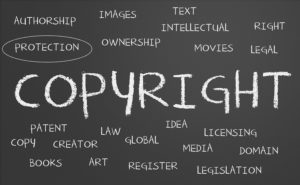Copyright Basics for Businesses

As a business owner, It is very important you have an interest in ensuring that your work remains proprietary, and that no competitors rip off the results of your investment in it. But how far should you go in obtaining intellectual property protection over various aspects of your business? In our article, we discuss particular aspects of your business that require copyright protection.
Items protected by copyright law include books, magazines, software, lyrics, brochure, newspapers, music, movies, audio recordings, and artwork. Copyright protects the form of expression rather than the subject matter of the writing. For example, a description of a machine could be copyrighted, but this would only prevent others from copying the description; it would not prevent others from writing a description of their own or from making and using the machine.
Although Copyright protection is automatic, even if you don’t register for it but it is important to note that if you want the greatest level of protection and the ability to sue for infringement, then you must register your creative work. Copyright registration puts you in a better position should you suffer from infringement.
To obtain a copyright, you or your business must show three things, including that:
- You authored a creative work.
- The work is original, and
- The work is fixed in a tangible medium of expression.
The fact that the work to be copyrighted must be in a tangible form is quite critical. This is because you cannot copyright an idea, concept, or strategy for your business (contrary to what many executives believe). You can only copyright something that has actually been reduced to written or recorded form.
As a starting point, realize that it’s likely not worth obtaining federal copyright registration over every single written item that a new business produces. Rather, you should consider the creative works that are truly important to your business’s operations or identity. Here are some examples of items upon which you might wish to file copyright registration:
- Elements of Your Business Website
if your business is investing a lot to create very good web content, graphics and the overall design of its website in order to advertise itself, then you may want to consider copyright registration. Copyright registration can help protect your ownership of the copyright in those materials.
It’s possible you are not the formal copyright owner over every aspect of your website. Also to remember is that copyright protection is vested in the author of the work. If you hired outside firms or individuals to create your website or various pieces of it, they are the authors of the parts that they have created unless you have a formal assignment agreement to transfer their rights.
If your website or any parts of it were created in-house by your own employees, then your business owns the copyright for those parts.
If you’re contemplating an agreement with an outside firm to create your website or any parts of it, you can include ownership of the copyright as part of your agreement. If you specify in your contract with the firm that your business will own the copyright to the final product(s), you will be able to use those works for other purposes if you want to.
Assuming you hold the copyright, you should begin using the copyright symbol (©) immediately, as a method of informing others that you intend to exercise control over the production, distribution, and display of the work.
- Print Materials
If your business produces important documents like brochures, magazines, or explanatory materials, then you should consider obtaining copyright protection for them as they are central to your business. Note that if you update these materials substantially (such as once per year), you might wish to obtain a new copyright registration on the updated version to avoid any doubt as to your rights.
- Other Creative Works
Your company’s business objective may be the production of creative works. In that case, you might wish to do more thorough copyrighting. If, for example, you paint paintings, draw custom designs, take photographs, or write articles, it might be worth obtaining copyright on each of those items.
This is particularly true if you believe you may develop revenue from licensing your work (for instance, through licensing your photography to multiple users). For creative professionals, copyright registration could be an essential piece of the overall business strategy.
Finally, to further exercise your rights to copyrighted materials, it is important you put a copyright notice on all copyrighted materials. This will decrease the likelihood of infringement. The copyright notice should be in a highly visible place on the property and should include the word copyright or the copyright symbol, the first year the work was issued to the public, and the formal name of the holder of the copyright.
Team 618 Bees
The information in this blog post (“post”) is provided for general informational purposes only, no information contained in this post should be construed as legal advice, nor is it intended to be a substitute for legal counsel on any subject matter. No reader of this post should act or refrain from acting on the basis of any information included in, or accessible through this post without seeking the appropriate legal or professional advice from the particular facts and circumstances at issue from a lawyer. This post is protected by intellectual property law and regulations. It may however be shared using appropriate sharing tools provided that our authorship is always acknowledged and this Disclaimer Notice attached
